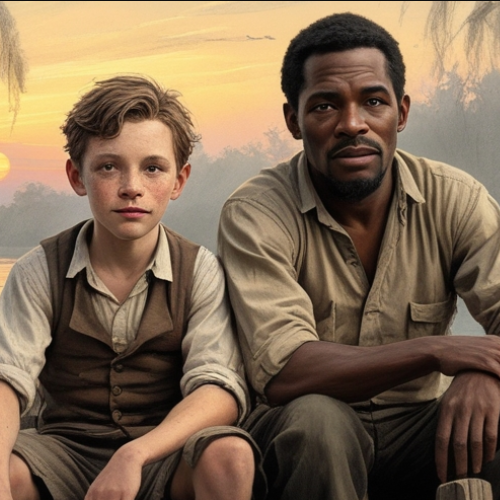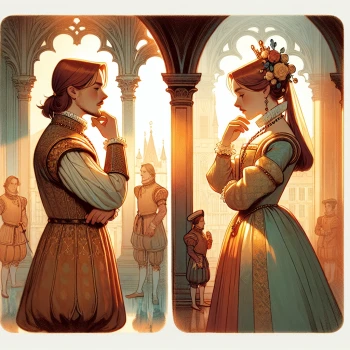
Mark Twain
Mark Twain, known for his sharp wit and insightful social commentary, authored timeless classics that challenged societal norms and explored moral evolution in 19th-century America.
Notable Works
Mark Twain remains one of America's most cherished literary voices, celebrated for his sharp wit, vivid storytelling, and insightful social commentary. Among his most influential works is "The Adventures of Tom Sawyer," a charming exploration of childhood adventure and mischief, set against the backdrop of a small Missouri town. Twain expanded upon these themes in the groundbreaking "Adventures of Huckleberry Finn," a novel widely regarded as his masterpiece, blending humor, adventure, and a powerful critique of societal norms, particularly regarding race and morality. Through the unforgettable adventures of characters like Huck Finn and Jim, Twain masterfully highlights the absurdity of prejudice and the complexities of freedom. Additionally, Twain's creativity shines in "A Connecticut Yankee in King Arthur's Court," a satirical novel that playfully juxtaposes modern American ingenuity against medieval superstition and tradition. Across these enduring works, Twain explores profound themes such as individual freedom, social injustice, and the inherent flaws of human nature, solidifying his legacy as a timeless commentator on the human condition.
Books by Mark Twain
Overview & Analysis
Mark Twain, born Samuel Langhorne Clemens, emerged as one of America's most distinctive literary voices, renowned for his incisive social commentary, sharp wit, and vivid storytelling. Growing up in the 19th century during a period marked by profound racial divisions, the American Civil War, and the Reconstruction Era, Twain developed a critical awareness of societal injustices, hypocrisy, and rigid class structures. His most celebrated works, including 'The Adventures of Tom Sawyer', 'Adventures of Huckleberry Finn', 'The Prince and The Pauper', and 'A Connecticut Yankee in King Arthur's Court', masterfully employ humor, symbolism, and allegory to highlight moral dilemmas and the absurdities of human behavior. Twain's unforgettable characters, such as Tom Sawyer, Huckleberry Finn, Jim, and Hank Morgan, embark on journeys that challenge prevailing conventions, expose institutional failings, and advocate for individual integrity and freedom. His enduring influence lies in his ability to blend profound philosophical reflection with engaging narratives, making his critique of social norms and exploration of ethical growth resonate across generations.
Back to TopInfluences & Worldview
Mark Twain's worldview was profoundly shaped by the turbulent social and political climate of 19th-century America. Growing up during a period marked by the divisive realities of slavery, the American Civil War, and the Reconstruction Era, Twain developed a keen sensitivity to the injustices of racial inequality, social hypocrisy, and rigid class distinctions. His works frequently critiqued entrenched social norms through sharp humor and vivid characterizations, underscoring his opposition to injustice and institutional authority. Twain was philosophically reflective, engaging deeply with moral questions, personal integrity, and the possibility of internal ethical evolution. He maintained a skeptical stance towards traditional religious and societal dogmas, advocating instead for the individual's ability to grow morally independent of institutional influence. As a critical social commentator, Twain leveraged symbolism, allegory, and richly drawn characters to convey his nuanced perspectives on human nature, societal flaws, and the pursuit of true freedom and equality.
Relevant Historical Events
- Reign of King Henry VIII (1509 – 1547): The reign of King Henry VIII was marked by significant political and religious transformation in England, notably the English Reformation and the establishment of the Church of England, breaking away from papal authority.
- English Poor Laws (1536 – 1601): Series of laws enacted to address poverty and social welfare, establishing provisions to support the poor and punish vagrancy, shaping England's social policy for centuries.
- Reign of Edward VI (1547 – 1553): Edward VI's short reign was characterized by intense Protestant reforms and political instability, as regents held significant power due to the young king's minority and fragile health.
- Rise of Scientific Rationalism (1700 – 1900): An intellectual movement emphasizing reason, scientific method, and empirical evidence as the primary sources of knowledge, challenging traditional religious and superstitious beliefs.
- Industrial Revolution (1760): Beginning in the late 18th century, the Industrial Revolution transformed economies from agrarian to industrial. In Russia, the effects were slower but still significant, leading to changes in labor, class structure, and urban growth—forces that influenced the aristocracy and education.
- Westward Expansion (1803 – 1890): The 19th-century movement in which settlers expanded U.S. territory westward across North America, driven by the ideals of Manifest Destiny, personal liberty, and economic opportunity. It reshaped American culture and geography, often at the expense of Indigenous peoples.
- Missouri Compromise (1820): A federal compromise that regulated slavery in western territories, revealing America’s deep divisions on the issue.
- Fugitive Slave Act (1850): A law requiring the return of escaped enslaved people, criminalizing aid to them and inflaming anti-slavery sentiment.
- American Civil War (1861 – 1865): A national conflict over slavery and states’ rights that profoundly shaped the social climate explored in Twain’s novel.
- Reconstruction Era (1865 – 1877): Post-Civil War period of transformation, racial tension, and failed reforms that forms the sociopolitical backdrop of the novel.
Notable Characters
Mark Twain is best known for creating memorable characters who embody the complexities and contradictions of American society in the 19th century. Among these, Huckleberry Finn, from "Huckleberry Finn," stands out as an adventurous, intuitive, and morally conscious youth who challenges the racial prejudices and social conventions of his time. His companion Jim, an escaped enslaved man, poignantly embodies the humanity and dignity denied by a society entrenched in slavery, highlighting Twain's critical examination of racial injustice and moral hypocrisy.
Tom Sawyer, appearing prominently in "The Adventures of Tom Sawyer" and "Huckleberry Finn," represents youthful mischief, imagination, and innocence, exploring themes of childhood freedom and the tensions between individualism and societal norms. Twain’s characters often display a blend of humor, resilience, and thoughtful introspection, reflecting the broader cultural and historical contexts of the Reconstruction Era, Westward Expansion, and the lingering impact of slavery in America. Through these vivid, relatable figures, Twain not only captures the spirit and struggles of his age but also conveys timeless insights into human nature and societal flaws.
Back to TopThemes of Focus
Mark Twain's literary works prominently explore themes of morality and social injustice, particularly through the lens of slavery, class inequality, and racial prejudice. Characters like Huckleberry Finn grapple with the moral dilemmas inherent in a society steeped in institutionalized racism, reflecting Twain's critical perspective on American society during the tumultuous periods surrounding the Civil War and Reconstruction. Complementing these central themes, Twain frequently employs satire and humor to critique societal hypocrisy, contrasting the innocence and honesty of youth with the corrupted adult world.
Additionally, Twain addresses themes of identity and the tension between appearance and reality, as evidenced in stories involving mistaken identities and role reversals, such as 'The Prince and The Pauper.' His exploration of these themes is deeply informed by historical events, including westward expansion, the aftermath of slavery, and the rise of scientific rationalism, providing a rich commentary on humanity's capacity for both profound ignorance and moral growth.
Back to TopLegacy & Impact
Mark Twain's impact on literature and society is profound, characterized by his sharp wit, humor, and incisive social commentary. His novels, notably "The Adventures of Huckleberry Finn" and "The Adventures of Tom Sawyer," have significantly influenced American literature by authentically depicting regional dialects, vivid characterization, and exploring complex moral and ethical dilemmas. Twain's works continue to resonate, addressing enduring themes of race, identity, freedom, and social injustice, making them relevant even today.
Twain's characters, such as Huck Finn and Tom Sawyer, are iconic figures that capture youthful innocence, moral growth, and societal critique, remaining staples in education curricula worldwide. His satirical approach to exposing the hypocrisies of his era—particularly concerning slavery, class structures, and institutional authority—has sparked critical discussions on America's historical and ongoing social issues.
Today, Twain's legacy is regarded with both reverence and critical examination. His novels are widely studied in schools and universities, adapted extensively in films, stage productions, and literature. Controversies occasionally arise regarding his use of racially charged language, prompting contemporary debates about historical context, censorship, and educational value, further highlighting Twain's enduring significance in shaping discourse on race, freedom, and social ethics.
Back to TopConclusion
Mark Twain's work remains profoundly relevant today, resonating through its sharp critique of social injustice, racial inequality, and institutional hypocrisy. His incisive humor and vivid storytelling have not only entertained readers but also shaped literary traditions by introducing authentic American voices and confronting uncomfortable truths about society. Twain's philosophical reflections on morality, individual integrity, and personal freedom continue to inspire thoughtful discourse, urging readers to examine their own assumptions and societal norms.
Exploring Twain's stories today offers invaluable insights into human nature and the enduring struggles for equality and justice. His nuanced characters and allegorical narratives encourage contemporary audiences to reflect honestly upon historical and modern-day prejudices, highlighting literature's power to drive empathy, awareness, and meaningful change. Twain's timeless relevance ensures that his writings remain essential reading for those seeking both literary pleasure and ethical reflection.
Back to Top


